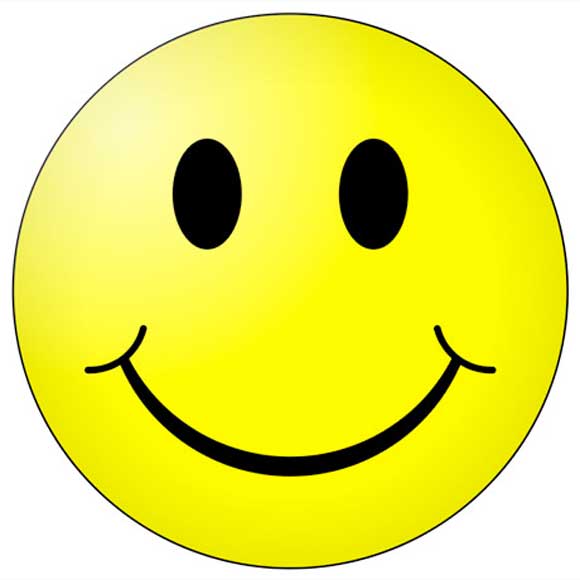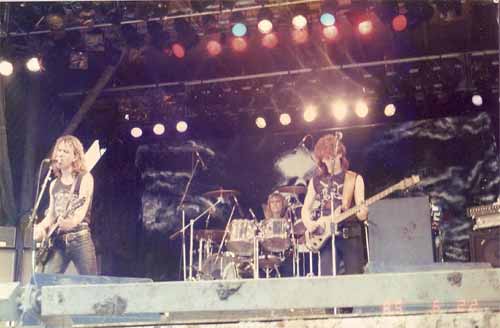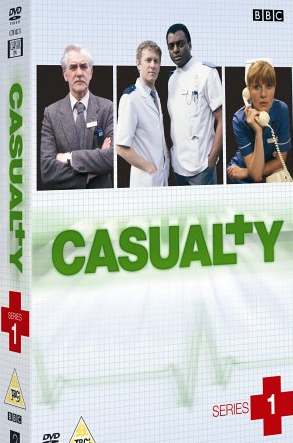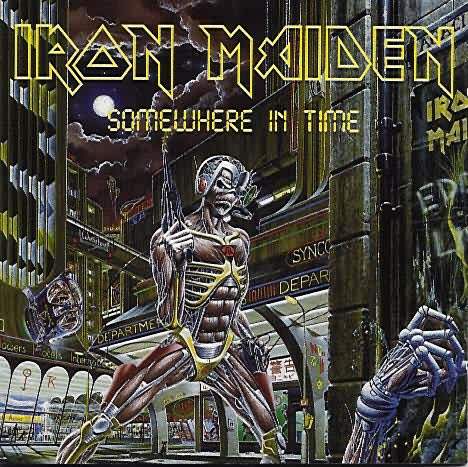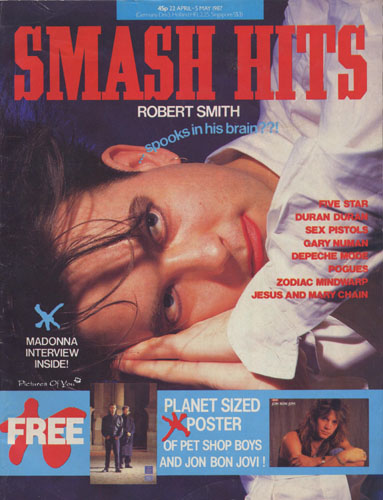It's October 1990, I'm in Portsmouth Guildhall and I'm beginning to think we might be a little out of our depth. But I think I need to go back a little.
Autumn 1988: Smash Hits has led on to Record Mirror, Kerrang!, Raw and pretty much any other metal magazine. Iron Maiden have superceded Def Leppard as my favourite band, and I've now started getting into Metallica and Anthrax. Acid house is about to blow up in the charts and the tabloids.
The next stage of my education has begun, and I'm now boarding full-time at a school near Poole in Dorset. On the first night, I ask the other kids in my dorm if any of them like heavy metal. This query is met by stony silence, although it turns out David Jones-Cooper likes The Cult. My contemporaries seem to be listening to a lot of Tracy Chapman and Bob Marley, mainly due to the influence of Steve White-Cooper. Steve is the biggest bloke in our year and, more importantly, has two older twin sisters who are apparently models. Older sisters are a big deal, as our school is single-sex until the Sixth Form, at which point a small number of the fairer sex are released into the school to cope with the attentions of a hundred emotionally-retarded teenage boys. I seem to remember a story that one of Steve's sisters once turned down the advances of Mick Hucknall, although I concede that this may be the sort of urban myth that gets related about somebody's older sister in every school in the land.* For all I know, it may well have actually happened to someone's older sister in every school in the land.
Speaking of redheads, everyone gets into Guns'N'Roses within about a week of starting term.
Older kids at school seem to like The Cure and Pixies a lot. I see one of them in a 'Death To The Pixies' t-shirt and can't work out whether he's a fan or is expressing a rather hardline opinion about a band he despises. Another one takes the piss out of me for wearing an Iron Maiden t-shirt, although the situation is probably rendered worse by the electric blue jeans I'm wearing at the time. One of our jobs as "shells" (the official school term for kids in their first year) or "grovs" (the unofficial and therefore more commonly-used term for the same) is to deliver magazines and newspapers to the rooms of older boys in our house. Some of them subscribe to 2000AD, which I latch on to as a hip alternative to Marvel or DC comics.
Ben Moores mentions Sabbat and Bolt Thrower to me. He's heard them because he's into role-playing games and flexidiscs of these two have been given away with Warhammer magazine. I notice that the latter band's name crops up as graffiti in the backgrounds of stories in 2000AD, along with Napalm Death, Extreme Noise Terror, Electro Hippies, Pop Will Eat Itself, Sonic Youth and various other exotic monickers. I don't fully understand what it's all about, though I suspect it might have something to do with skateboarding.
During the course of the school year, I delve into the world of thrash metal. I get a flexidisc of Bristol thrashers Onslaught free with Raw magazine, and get into them so much I'm given the nickname Onslaught, later shortened to 'Slaught. In all ill-advised attempt at humour, I kick Mark Oliver in the balls. His pained response is "Onslaught, you Sabbat!" I'm not making this up.
Autumn 1989: I return to school for the second year (confusingly named the Fourth Form) having narrowly missed out on going to my first gig. Onslaught, Annihilator and Horse (London) played in Bristol in July, and I pestered my Dad to be allowed to go. He agreed on the conditions that he should take me, and that we should get seated tickets in the upper circle, my father plainly not keen on the idea of getting caught in a mosh. Sadly, the venue isn't opening its upper seating area for the Onslaught show, dashing my hopes (and, I can't help thinking, relieving my dad no end).
The summer also saw the release of the year's best single, 'Fight The Power' by Public Enemy. History records that it only got to No.29 in the charts, a full 16 places lower than 'Do The Right Thing' by Redhead Kingpin and the FBI. Meanwhile, 'French Kiss' by Lil Louis made me feel slightly uncomfortable when listening to the Radio 1 chart show in the car with my parents.
A bunch of us are by now well into our indie. Andy Bell's reading broadsheet music reviews, Simon Hildesley is getting a bunch of good music off his older sister, and I'm geeking out on music magazines, TV and radio. The Wonder Stuff, Pixies, Pop Will Eat Itself, The Wedding Present, The Sundays, The Fall and The Sugarcubes have all started registering on our radar, and in November the now-famous 'Top Of The Pops' featuring The Stone Roses and Happy Mondays turns the world briefly baggy, leading to such momentous events as Spike Island, Bez becoming the most famous non-musician in a band ever, and Dominic Fry buying the first New Fast Automatic Daffodils album.
At some point in 1989 - I haven't been able to check the exact date, though I suspect it was in the autumn - Arena broadcasts a series on heavy metal which includes great archive footage of Led Zeppelin alongside more recent interviews with and concert recordings of Metallica, Guns'N'Roses and Slayer. The whole series is fucking brilliant and fully confirms that I am on the right path. Napalm Death are featured prominently - I admit now that I really didn't know what to make of them intially, but, as previously discussed, this has often been something of a guarantee that I'll eventually become a convert. In fact, I'm wearing a Napalm t-shirt as I type this. The interview with Napalm Death is conducted in one of their bedrooms and the footage of these surly youths is absolute television gold.
By the time 1990 starts, I'm reading the weekly music paper Sounds and listening to John Peel's show on Radio 1, which over the next decade and a half will introduce me to more new and exciting music than any other source. Thanks, John.
Autumn 1990: I return to school for my third year there (which, it won't entirely surprise you to learn, is called the Fifth Form) clutching 'Get Me Out', the new 12" single by New Model Army. I'd previously heard the singles from their album 'Thunder & Consolation', and even gone so far as to buy 'Green And Grey', which I maintain is a fine song. But 'Get Me Out' was somehow more accessible, sounding both more contemporary and more urgent than their other, occasionally dour, work. My friends and I get substantially into this tune and are chuffed as hell to learn that they're playing Portsmouth (where Simon Hildesley lives) in October (on our half-term week).
And so, on the 22nd of October 1990, I head to my first ever gig alongside Simon Hildesley and Andy Bell (I don't remember whether Ben Moores was there, although I can't think why he wouldn't have come - sorry Ben!). Now, I was almost certainly wearing a metal band t-shirt, but in general it felt like we were the proverbial sore thumbs, sticking out a country mile with our sensible trousers and received pronunciation in what I remember as a veritable sea of crusties, goths, hippies and punks, many of whom were wearing clogs. Hindsight tells me that many of these people had almost certainly come from the same social strata as ourselves, but with a few years headstart they'd managed to get better at disguising their semi-posh origins behind the warpaint of their tribal allegiances.
The support band is the Levellers; as this was before 'Levelling The Land', none of us has heard them before. One of the band has become a father that very day (terrifyingly, this sprog is about to turn 20 in the present day, and as the Levs are based in Brighton may well walk the same streets as me), so in his absence they play an acoustic set, which is good enough to encourage me to buy a t-shirt. Closer inspection of the childlike artwork on it reveals that it includes a crude drawing of a punk sticking two fingers up at a policeman.
Between bands, NMA's violinist Ed Alleyne-Johnson does a brief solo set, playing the sort of violin-with-effects pedals stuff which he'll shortly leave the band to concentrate on, making a reasonable living selling his solo albums to the sort of people who wear a lot of velvet and buy crystals.
When New Model Army come on, we're still sat on the seats at the back of the hall. But one song in, I feel the need to head down into the crowd, where I spend the rest of the evening attempting to figure out how I'm supposed to dance at a gig, surrounded by people forming human pyramids and doing that goth dance where you wave your arms around in front of your face in a way that's supposed to be dramatic (if you're a bloke) or alluring (if you're a lass). Nobody gives me grief or beats me up, although I might have been stepped on by a clog or two. New Model Army play all the songs I know and quite a few I don't (yet) and are as exciting as I'd hoped my first gig might be.
Simon's mum is waiting for us in the foyer when the gig finishes. Fantastically, she's been chatting to a crusty fellow who'd been stretchered out after getting injured while crowd-surfing. She declares him a fine young man and doesn't appear to have developed grave concerns for our well-being despite his condition.
The next morning, I get on a train back to Somerset at Havant station. A girl about my age gets on the same carriage wearing a New Model Army t-shirt, which inevitably elicits various hand symbols and coded messages from my friends which roughly translate as "Get in there, my son." Surprisingly, I make conversation with her (I'm afraid I almost certainly broke the ice with a comment along the lines of "I don't think I need to ask what you did last night") and it turns out she's heading all the way back to the same station as me. We make conversation for the next couple of hours and then never see each other again.
I suspect that's your appetite for nostalgia sated for now. Next time, my excursions to gigs slowly rack up and we encounter the support band nobody else liked, more offensive t-shirts, Neds and Carter-mania and an exciting new voice from Yeovil...
*In late 2009, I was to board a bus in Brighton with wet hair to be met by a barrage of cries of "Mick Hucknall" from some ill-mannered young men a few seats behind me. This kept them fully entertained until the end of their journey, at which point one of them decided to have one last crack and actually came up and asked me for my autograph. I broke my silence to say "I'm not the cunt you think I am", which he fortunately interpreted as a mild rebuke rather than an act of outright aggression.
Thursday 14 October 2010
Sunday 3 October 2010
Prologue: Welcome To The Terrordome
If she'd known the course that VCR would send me on, I suspect my grandmother would have chosen a different present.
It was Christmas 1986, and there was a very specific reason why I wanted a video recorder. At this point, I was a weekly boarder at a local private school. This arrangement meant that I boarded between Monday and Saturday, but could go home every weekend (apart from the first and last of term, presumably for the sort of arcane, lost-to-the-mists-of-time reason which fuels most such boarding school traditions). Television consumption was strictly rationed to set times at the weekend; I remember being allowed to watch Casualty on a Saturday night, but only the first half, enabling us to play the classic game of guessing which characters were going to get electrocuted/impaled through the shoulder/lose a limb without finding out whether they ultimately pulled through. This is almost certainly why I now put so little value on human life. (N.B. If there was a "humour" font, I would have used it for that last sentence, OK?)
Lack of medical drama closure aside, it seemed to me entirely unacceptable that I should be denied access to the many wonders of weekday television. With the video recorder set up in my bedroom, I was able to leave for the new term in January 1987 safe in the knowledge that my Dad now had a list of all the unmissable programmes I wanted him to record in my absence. I recall that this included Lenny Henry's show, which I was pretty sure was the funniest entertainment imaginable, this being a long time before he started advertising mid-price hotel chains.
I also asked for Top Of The Pops to be recorded. Now, I'd shown a little bit of interest in music before this. Like any early-'80s schoolboy, I'd been devoted to Madness and Adam & The Ants - although, for "devoted to", you should probably read "knew up to two of their songs and found the accompanying videos rather entertaining". Subsequently, I'd request volumes of the 'Now That's What I Call Music' series, on satisfyingly chunky double cassette, for birthday and Christmas presents, which my folks would often supplement with service station-type cassettes along the lines of 'The Boston Pops Orchestra Play The Hits Of Stevie Wonder'. In truth, it would be years before I heard the arguably superior original versions of, say, 'Masterblaster' or 'He's Misstra Know It All'.
But, more recently, somebody had smuggled a copy of 'Smash Hits' into school - magazines being dangerous contraband and strictly forbidden in such an environment, with the exception of more educational tomes of the 'National Geographic' variety - and it offered a curious glimpse of another world. On the cusp of my teens, I had an inkling that there might be difficult and confusing times to come, and figured that a working knowledge of pop music might come in rather handy. This opinion may well have been formed a couple of years earlier, when, while staying with my godparents in Essex, I went to a house party being held by older kids where I saw actual teenagers actually getting off, while somebody asked me my opinion on Scritti Politti, a band name they managed to pronounce without any hint of the letter T. (I should probably point out that this was around the time of hits like 'The Word Girl', rather than their earlier, agit-prop period, which I suspect hadn't made much of a splash in Saffron Walden.) Something else which had piqued my interest were the Iron Maiden albums an older kid at school had in the junior common room; my most significant interest at this point was American comic books, and the gatefold LP sleeves of 'Live After Death' and 'Somewhere In Time' were tailor-made to reel in anyone reared on Marvel and DC Comics.
Watching Top Of The Pops became a weekly ritual, with my brain initially absorbing the rhythms of the charts, with their new entries and non-movers, highest-climbers and rapid fallers, like the changing allegiances and rewritten continuities of characters in the comic book universes I was still reading obsessively. The poppiest tunes made the initial impact - it wasn't until August that I actively disliked a Number 1 single (Rick Astley's 'Never Gonna Give You Up'). But over time, it became apparent that the songs I initially found disconcertingly hard to understand, perhaps even slightly frightening, were the ones I kept rewinding to (gotta love the period detail, right?). Depeche Mode, The Cure, Sisters Of Mercy, Siouxsie And The Banshees, The Jesus & Mary Chain and The Mission all had hit singles in 1987, and they were all covered in 'Smash Hits' (which I was now getting my folks to buy me every fortnight) that year, a surprisingly large number of them as cover stars, which shows how inclusive pop music could be in the days before boy bands and girl groups came to dominate the medium. Years later, I would be accosted by a youth on a Southampton street accusing me of being a goth. At the time, I felt this was a groundless claim, but looking at that list I can concede that there's certainly a degree of gothery in my musical DNA...
It wasn't all back-combed hair and kohl eyeliner, though. In parallel to the aforementioned bat-friendly hordes, I was being exposed to all sorts of other stuff. The Smiths and New Order would lead to the world of indie, a phrase I didn't really understand for ages, but developed a sort of instinctive taste for. House music was having some pretty serious hits, like Steve 'Silk' Hurley's 'Jack Your Body', which 'Smash Hits' hilariously and dutifully transcribed in its regular song lyrics feature, like it would any other chart smash ("J-j-j-j-j-j-j-j-jack your body", anyone?). Hip hop was beginning to make its claim as pop music's dominant strain with chart appearances from the Beastie Boys, Run DMC, LL Cool J, Eric B & Rakim and, by the end of the year, Public Enemy. And, perhaps most significantly, The Cult and Def Leppard introduced me to heavy metal, the latter's 'Hysteria' becoming the first album I bought with my own money. As my taste in metal progressed into heavier territories, I would sometimes feel a little ashamed of this, but I found myself thoroughly enjoying their set at Download in 2009 - even the point where a man lumbered out of the crowd to point at my Napalm Death t-shirt and exclaim, "You shouldn't be enjoying this!"
Throughout the rest of my time at this school, music rapidly replaced comic books as my priority obsession, to the point where I would spend mealtimes "treating" my friend Charlie Minogue (no relation - he checked in '88) to constant pop quizzes. Overhearing this led my headmaster to fear that I was seriously odd, apparently lamenting that I was more interested in the pop charts than anything more sensible like, say, cricket. My only regret about all of this would be if Charlie now has some sort of phobia about pub quizzes.
As I draw this episode to a close, you'll note that I still haven't got to my first gig. Technically, I did see The Yetties in this period, a sub-Wurzels outfit who once played at my school and who were probably considered a dangerous compromise for a headmaster who was once heard to opine, when faced with a Sunday supplement article about David Gilmour, Roger Waters, et al, "Who is this Pink Floyd? Is he some sort of drug dealer?" You'll forgive me for not considering this a proper first gig, given that attendance was mandatory, it was in my school's assembly hall, and, look it was the bloody Yetties, OK?
We'll get to New Model Army next time.
It was Christmas 1986, and there was a very specific reason why I wanted a video recorder. At this point, I was a weekly boarder at a local private school. This arrangement meant that I boarded between Monday and Saturday, but could go home every weekend (apart from the first and last of term, presumably for the sort of arcane, lost-to-the-mists-of-time reason which fuels most such boarding school traditions). Television consumption was strictly rationed to set times at the weekend; I remember being allowed to watch Casualty on a Saturday night, but only the first half, enabling us to play the classic game of guessing which characters were going to get electrocuted/impaled through the shoulder/lose a limb without finding out whether they ultimately pulled through. This is almost certainly why I now put so little value on human life. (N.B. If there was a "humour" font, I would have used it for that last sentence, OK?)
Lack of medical drama closure aside, it seemed to me entirely unacceptable that I should be denied access to the many wonders of weekday television. With the video recorder set up in my bedroom, I was able to leave for the new term in January 1987 safe in the knowledge that my Dad now had a list of all the unmissable programmes I wanted him to record in my absence. I recall that this included Lenny Henry's show, which I was pretty sure was the funniest entertainment imaginable, this being a long time before he started advertising mid-price hotel chains.
I also asked for Top Of The Pops to be recorded. Now, I'd shown a little bit of interest in music before this. Like any early-'80s schoolboy, I'd been devoted to Madness and Adam & The Ants - although, for "devoted to", you should probably read "knew up to two of their songs and found the accompanying videos rather entertaining". Subsequently, I'd request volumes of the 'Now That's What I Call Music' series, on satisfyingly chunky double cassette, for birthday and Christmas presents, which my folks would often supplement with service station-type cassettes along the lines of 'The Boston Pops Orchestra Play The Hits Of Stevie Wonder'. In truth, it would be years before I heard the arguably superior original versions of, say, 'Masterblaster' or 'He's Misstra Know It All'.
But, more recently, somebody had smuggled a copy of 'Smash Hits' into school - magazines being dangerous contraband and strictly forbidden in such an environment, with the exception of more educational tomes of the 'National Geographic' variety - and it offered a curious glimpse of another world. On the cusp of my teens, I had an inkling that there might be difficult and confusing times to come, and figured that a working knowledge of pop music might come in rather handy. This opinion may well have been formed a couple of years earlier, when, while staying with my godparents in Essex, I went to a house party being held by older kids where I saw actual teenagers actually getting off, while somebody asked me my opinion on Scritti Politti, a band name they managed to pronounce without any hint of the letter T. (I should probably point out that this was around the time of hits like 'The Word Girl', rather than their earlier, agit-prop period, which I suspect hadn't made much of a splash in Saffron Walden.) Something else which had piqued my interest were the Iron Maiden albums an older kid at school had in the junior common room; my most significant interest at this point was American comic books, and the gatefold LP sleeves of 'Live After Death' and 'Somewhere In Time' were tailor-made to reel in anyone reared on Marvel and DC Comics.
Watching Top Of The Pops became a weekly ritual, with my brain initially absorbing the rhythms of the charts, with their new entries and non-movers, highest-climbers and rapid fallers, like the changing allegiances and rewritten continuities of characters in the comic book universes I was still reading obsessively. The poppiest tunes made the initial impact - it wasn't until August that I actively disliked a Number 1 single (Rick Astley's 'Never Gonna Give You Up'). But over time, it became apparent that the songs I initially found disconcertingly hard to understand, perhaps even slightly frightening, were the ones I kept rewinding to (gotta love the period detail, right?). Depeche Mode, The Cure, Sisters Of Mercy, Siouxsie And The Banshees, The Jesus & Mary Chain and The Mission all had hit singles in 1987, and they were all covered in 'Smash Hits' (which I was now getting my folks to buy me every fortnight) that year, a surprisingly large number of them as cover stars, which shows how inclusive pop music could be in the days before boy bands and girl groups came to dominate the medium. Years later, I would be accosted by a youth on a Southampton street accusing me of being a goth. At the time, I felt this was a groundless claim, but looking at that list I can concede that there's certainly a degree of gothery in my musical DNA...
It wasn't all back-combed hair and kohl eyeliner, though. In parallel to the aforementioned bat-friendly hordes, I was being exposed to all sorts of other stuff. The Smiths and New Order would lead to the world of indie, a phrase I didn't really understand for ages, but developed a sort of instinctive taste for. House music was having some pretty serious hits, like Steve 'Silk' Hurley's 'Jack Your Body', which 'Smash Hits' hilariously and dutifully transcribed in its regular song lyrics feature, like it would any other chart smash ("J-j-j-j-j-j-j-j-jack your body", anyone?). Hip hop was beginning to make its claim as pop music's dominant strain with chart appearances from the Beastie Boys, Run DMC, LL Cool J, Eric B & Rakim and, by the end of the year, Public Enemy. And, perhaps most significantly, The Cult and Def Leppard introduced me to heavy metal, the latter's 'Hysteria' becoming the first album I bought with my own money. As my taste in metal progressed into heavier territories, I would sometimes feel a little ashamed of this, but I found myself thoroughly enjoying their set at Download in 2009 - even the point where a man lumbered out of the crowd to point at my Napalm Death t-shirt and exclaim, "You shouldn't be enjoying this!"
Throughout the rest of my time at this school, music rapidly replaced comic books as my priority obsession, to the point where I would spend mealtimes "treating" my friend Charlie Minogue (no relation - he checked in '88) to constant pop quizzes. Overhearing this led my headmaster to fear that I was seriously odd, apparently lamenting that I was more interested in the pop charts than anything more sensible like, say, cricket. My only regret about all of this would be if Charlie now has some sort of phobia about pub quizzes.
As I draw this episode to a close, you'll note that I still haven't got to my first gig. Technically, I did see The Yetties in this period, a sub-Wurzels outfit who once played at my school and who were probably considered a dangerous compromise for a headmaster who was once heard to opine, when faced with a Sunday supplement article about David Gilmour, Roger Waters, et al, "Who is this Pink Floyd? Is he some sort of drug dealer?" You'll forgive me for not considering this a proper first gig, given that attendance was mandatory, it was in my school's assembly hall, and, look it was the bloody Yetties, OK?
We'll get to New Model Army next time.
Subscribe to:
Posts (Atom)
